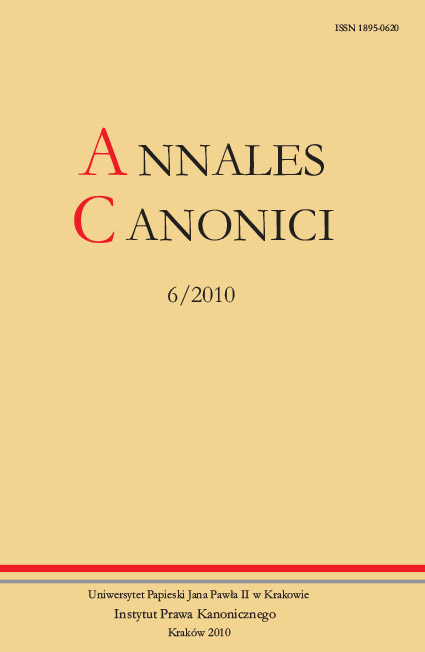El ministerio judicial del obispo en la antigüedad cristiana
DOI:
https://doi.org/10.15633/ac.0612Abstract
La voz episcopos significa etimologicamente vigilante, guardián, protector, entre otros. Prolongando en el tiempo la vigilancia amorosa del „Pastor soberano”, está constituido el ministerio episcopal en la Iglesia para ser símbolo viviente de la vigilancia y cura del „Pastor bueno”, ejercidas siempre al servicio de las almas y de la Iglesia. De acuerdo con la capitalidad del obispo, que preside la Iglesia que tiene encomendada, debe considerarse la actuación que específicamente está obligado a desempeñar en el servicio de su comunidad. En cambio de acuerdo con los criterios expuestos por San Pablo en 1 Cor. 6, 1–11, cualquiera que sea la clase del litigio surgido entre cristianos, ha de resolverse dentro de la comunidad eclesial. Y concretamente más a quién corresponde el oficio de juzgar, como dice el texto de Didascalia Apostolorum: „Asistan a los juicios los presbíteros y los diáconos con el obispo juzgando sin acepción de personas”. El officium judiciorum ocasionaba a los obispos algunas molestias. En primer lugar, por las dificultades inherentes a la misma actividad judicial, pues a los mismos jueces les resulta laboroso dar con el derecho mismo, y es dificil no violarlo una vez conocido. Además este negocio implicaba peligros de que los más débiles, por fallar en los negocios, naufraguen en la fe.
Downloads
Published
Issue
Section
License
Copyright (c) 2010 Robert Kantor

This work is licensed under a Creative Commons Attribution 4.0 International License.
The author declares that he owns the copyright to the work (article) and that it is not limited in the scope covered by the above declaration and that the work (article) is an original work and does not infringe the copyright of other persons.
The author allows the Pontifical University of John Paul II in Krakow to use the paper free of charge, non-exclusive and unlimited in time by, i.e.:
– keeping in records and reproduction of the copies of the work using printing, reprography, magnetic recording and digital technology;
– trade in the original or copies on which the work has been recorded (introduction to the market, lending or rental of the original or copies, public exhibition, display, as well as making the work available to the public in such a way that everyone can have access to it in a place and at a time chosen by them);
– inclusion of the work in a collective work;
– granting by the Pontifical University of John Paul II in Krakow a Creative Commons Sub-licence Authorship Recognition-Non-commercial Use-No Subsidiaries 3.0 Poland
The Pontifical University of John Paul II in Krakow makes the work available on the Magazine Platform of the university under the Creative Commons Attribution-Non-commercial Use-No Subsidiary Works 3.0 Poland license.
Thus, it entitles all interested parties to use the work under the following conditions:
- the author and the title of the work will be given,
- the place of publication (journal title and internet address of the originally published work) will be indicated,
- the work will be distributed in a non-commercial manner,
- no dependent works will be created.

